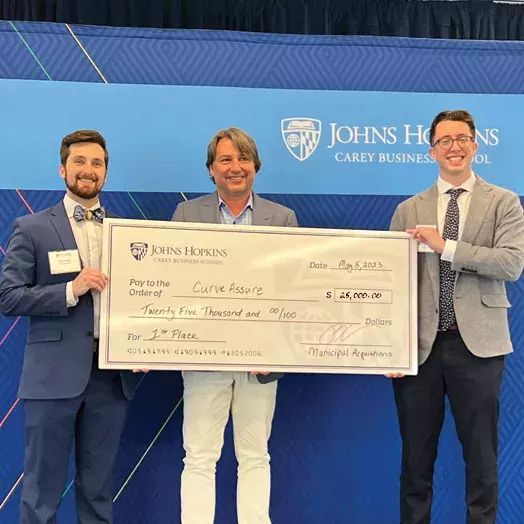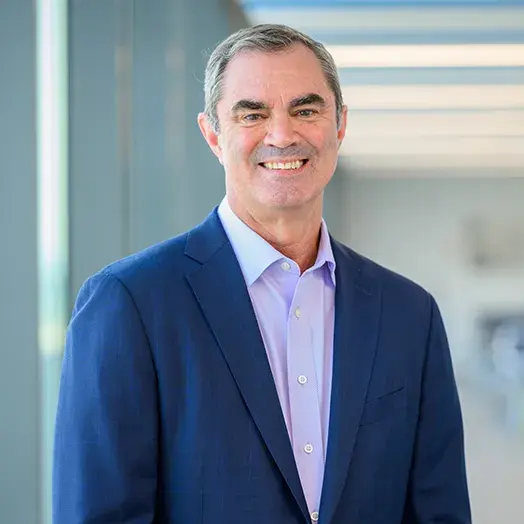Budding entrepreneurs from all Johns Hopkins institutions compete in the Carey Business School Student Venture Showcase and gain visibility with venture capitalists.

Entrepreneurship with an edge: How the Student Venture Competition launches student startups
The journey to becoming a successful entrepreneur starts with an idea. For some of the most competitive ideas, the Student Venture Showcase is emerging as the premier opportunity to make the most of them.
In partnership with Johns Hopkins Technology Ventures, Carey Business School hosts the annual Student Venture Showcase, a high-stakes competition for students from all Johns Hopkins institutions to pitch their startup to a panel of experienced venture capitalists.
But this event isn’t your regular student competition. JHTV’s FastForward U works with students to incubate, accelerate, fund, mentor, and support the students’ startups. Its director of student ventures, Josh Ambrose, describes the showcase as the marquee event of all case competitions.
“We push the best of our teams to participate in the showcase,” Ambrose said. “So those who have built something that has traction and are really taking the idea seriously.”
The event serves as a catalyst for the startup journey. In addition to the pitches, students gain insight from the judges to improve their vision.
“The showcase provides a forum for students to not only present their ideas and potentially win funding, but they also get real industry feedback and expertise to take with them to advance their businesses,” said Jon Kling, founder and chief executive officer of Municipal Acquisitions and sponsor of the Student Venture Showcase.
Kling, who also invests in early-stage companies, says although participating students might not take first place, they may still receive funding from him or one of the judges on the panel.
“I’ve had students reach out to discuss their startups that I ultimately ended up investing in,” said Kling. “But regardless, I am always available to help students in any way I can to support their journey.”
Winning big
This year’s Student Venture Showcase took place in May. MBA candidate Evan Haas and business partner Graham Zolkowski (MBA ’23) pitched CurveAssure and took home first place and $25,000 in non-dilutive funding, which means they retain full control of their company instead of giving a percentage to the funder.
CurveAssure is a pre-FDA startup that’s developing an at-home spinal assessment tool to help doctors and patients find optimal treatment for spine conditions. The company is focusing on patients with spinal deformity and degeneration, as those are some of the most at-risk patient populations.
Haas, the company’s co-founder and chief executive officer, enrolled in the Flexible MBA program after graduating from the Johns Hopkins Whiting School of Engineering with a Master’s in Bioengineering Innovation and Design. At the time of the showcase, Zolkowski was head of business strategy. He has since moved to an advisory role for CurveAssure and now works full-time for Abbott as an associate product manager. A third Hopkins alumnus, Antony Fuleihan (MSE ’23) is another co-founder, who serves as the company’s chief technology officer. He helped prepare and design the pitch.
The trio sees the Student Venture Showcase as a big opportunity for early-stage startups, saying the panel of investors played a huge role in helping them understand how to move their business forward. The showcase also helped them to check their business plans, see how they would hold up in front of real investors, and gain real pitch experience.
"Even the preparation—all the hours we put in, all of the late nights throughout the competition—it helped us get to a place where we felt comfortable putting our ideas out in a public setting,” said Haas.
“I feel very comfortable going up in front of dozens of people and pitching business plans,” Zolkowski said. “I don’t know if I would have said that before starting this showcase process. The funding and networking opportunities are great, but the biggest takeaway from the showcase would be the experience of pitching the business plan. It was one of the most impactful experiences of my MBA program.”
How FastForward U fuels startups’ futures
“FastForward U serves as a center for students who want to be innovators and entrepreneurs,” said Ambrose. “We are the epicenter of all things related to startup incubation. Whether it’s someone who has an idea or someone who’s already raised significant funding, FFU is there to help support.”
FFU has six accelerator opportunities throughout the year. The opportunities allow students to connect with mentors, explore their innovations, and ultimately build their startups with support from non-dilutive grants through FFU. These opportunities are open to all Carey Business School and JHU students.
“The philanthropic dollars and funding for collaboration opportunities are made possible by our Johns Hopkins alums, like Jon [Kling], who give back,” Ambrose said. “And it goes directly to the students to empower the next generation of entrepreneurs.”
Kling, a 2004 Master of Real Estate and Infrastructure alumnus, developed the original concept for his real estate investment company, which invests in public-private partnerships throughout the United States. He gives back as the event’s sponsor because of his experience at Carey.
“My experience was so powerful and transformative that I really wanted to encourage students who have their own business plans to pursue them,” Kling said. “As a student entrepreneur, there is value in winning [the showcase]. It serves as a stepping-stone to get attention from the venture community.”
Kling’s firm, which has sponsored the event since its inception, helps plan the event throughout the year. And he has high hopes for the evolution of the showcase. While the audience is involved in some aspects, like voting for the “audience choice award,” Kling says the showcase should also serve as inspiration for students in the audience.
“Maybe it’s the first-year student who has a great idea but doesn’t know how to pursue it. I want that student to be in the audience during the showcase to see that they can get involved next year.”


